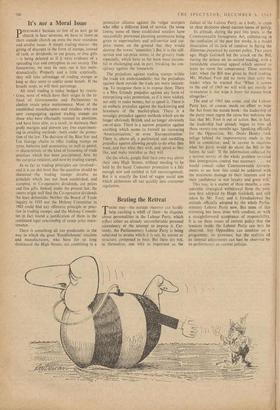Beating the Retreat
THERE may—the outside observer can hardly help catching a whiff of them—be disputes about personalities in the Labour Party, which reflect either an already uncomfortable personal ascendancy or the attempt to impose it. Cer- tainly, the Parliamentary Labour Party is being subjected to strains which it is not, by nature or structure, composed to bear. But these are not, in themselves, one whit as important as the failure of the Labour Party, as a body, to come to clear decisions about current issues of policy. Its attitude, during the past two years, to the Commonwealth Immigrants Act, culminating in the confusion of the past few weeks, is a model illustration of its lack of candour in facing the dilemmas presented by current policy. Two years . ago. Hugh Gaitskell led the attack on the Bill, during the debate on its second reading, with a
formidable emotional appeal which seemed to leave no room for compromise. Three months later, when the:Bill was given its third reading, Mr. Michael Foot did no more than echo his leader when he warned that 'When it comes to the end of 1963 we will wish not merely to re-examine it, but wipe it from the statute hook altogether.'
The end of 1963 has come, and the Labour Party has, of course, made no effort to wipe the Act from the statute book: the leadership of the party must regret the cause but welcome the fact that Mr. Foot is out of action. But, in fact, the leadership had already begun to trim all those twenty-one months ago. Speaking officially for the Opposition, Mr. Denis Healey took refuge behind the improvements made in the Bill in committee; and, in answer lo inquiries what his party would do about the Bill in the future, he said: If the information collected by a serious survey of the whole problem revealed that immigration control was necessary . . . we would consult other Commonwealth Govern- ments to see how this could be achieved with the minimum damage to their interests and to their confidence in our loyalty and good will.'
This was, in a matter of three months, a con- siderable strategical withdrawal from the posi- tion first adopted by Hugh Gaitskell, and still taken by Mr. Foot; and it foreshadowed the attitude officially adopted by the whole Parlia- mentary Labour Party now. But none of this trimming has been done with candour, or with a straightforward acceptance of responsibility. It is on these issues of current policy that the tensions inside the Labour Party can best be observed. Any Opposition can combine on a programthe, on promises; but the realities of its internal adjustments can best be observed by its performance on current policies.






































 Previous page
Previous page